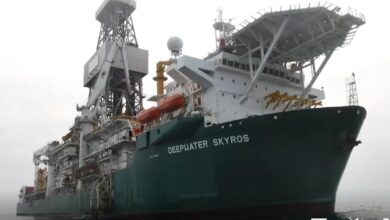Editorial: Progress made since Piper Alpha, but industry must keep pushing for openness
Guest Editorial

UK Health and Safety Executive
I recently attended the incredibly moving rededication service of the Piper Alpha memorial in Aberdeen, 25 years to the day after the North Sea tragedy took the lives of 167 offshore workers. This served to emphasize that, although the offshore industry is global, it can greatly affect local communities. The sight of an elderly lady, surrounded by her children and grandchildren, silently weeping as the roll call of those who died was read out, and one of the youngsters laying a wreath of remembrance for the granddad she never knew, will remain with me forever.
The measure of any industry in recovering from disaster is its ability to learn lessons, make improvements and move on. The Piper 25 Conference in Aberdeen provided an opportunity to check on the industry’s progress since those dark days, and it was widely acknowledged there had been a sea change in attitudes and practices since then.
However, the problems at Piper were obvious – poor control of work processes, emergency procedures plainly inadequate for any incident, lack of fit-for-purpose regulations and regulators, and ineffective involvement of the workforce. It now seems incredible that these issues were not resolved well before that fateful evening.
Yet, industry found itself in a similar situation after Macondo, where the lack of a credible industry response to a sub-sea blowout just seems so implausible now. It got me thinking about what we are currently blind to, and what our successors will similarly wonder – why we had not spotted something that is so obvious when they come to pick up the pieces. The experience in the UK is that we are still seeing new incidents happening for old reasons, particularly because of poor control of work processes, an issue that was one of the root causes of Piper. Repeatedly doing the same thing and expecting a different result is insane. The industry rightly professes there is no cause for complacency, but offshore industry leaders should feel pressure as they strive to constantly improve their safety and business risk performance.
Helping to resolve these issues requires much better sharing of lessons within the offshore industry and across key stakeholders. I see some good indications – the recent IADC European Operations Forum meeting with European offshore regulators was an excellent example of that dialogue. The regulators are also playing their part, with the International Regulators Forum organizing its biannual offshore safety conference in Perth, Australia, in October to provide another opportunity for regulators and industry to identify areas for improvement.
However, I am still frustrated by the reluctance in parts of the industry to share lessons. For instance, the establishment of the OGP Well Control Incident Database was a big step forward but one that is threatening to fall at the first hurdle because of poor industry response to anonymously report well control incidents. Keeping safety lessons to yourself is just not acceptable these days.
A drive for more openness is essential if the industry wishes to keep the confidence of its workforce, its regulators and a wider public still skeptical of the industry’s ability to drill safely and protect the environment.
Steve Walker is head of strategic intervention for the UK Health and Safety Executive Energy Division – Offshore.




